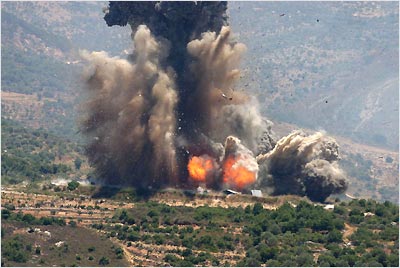
Smokes rise from the border of Israel and
Lebanon, July 12, 2006. Israeli Air Forces carried out strikes against Hezbollah
targets in southern Lebanon and 30 targets have been attacked so far on
Wednesday. -Xinhua
The international community voiced concern over tension at the border between
Israel and Lebanon on Wednesday, calling for the release of two captured Israeli
soldiers by the Lebanese militant group Hezbollah.
In a statement issued by his spokesman, UN Secretary-General Kofi Annan
condemned Hezbollah's attacks across the Blue Line, saying the violent act was a
blatant breach of UN Security Council resolutions.
He called on all concerned parties to exercise maximum restraint to avoid any
further escalation, stressing that "all should respect fully their obligations
under international humanitarian law."
Finland, current holder of the European Union (EU) presidency, called on
Hezbollah to "immediately and unconditionally" release the two Israeli soldiers,
and to cease all attacks on Israel.
The Lebanese government also has a responsibility to prevent a deterioration
of the situation, said a statement from Finland.
In Berlin, Germany urged Lebanese militants to release the Israeli soldiers
"immediately and unconditionally."
A Foreign Ministry spokesman said German Foreign Minister Frank-Walter
Steinmeier was in contact with his counterparts in the Middle East to help
mediate the crisis.
French Foreign Minister Philippe Douste-Blazy said he was "very concerned"
about the tensions and asked for the release of the two Israeli soldiers.
Paris would remain in permanent contact with all the concerned parties and
with those who made efforts to find a solution to this crisis, he added.
U.S. Secretary of State Condoleezza Rice condemned the capture, which
"undermines regional stability."
"I condemn today's kidnapping by Hezbollah, a terrorist organization, of two
Israeli soldiers," Rice said in a statement issued in Paris ahead of a foreign
ministers meeting over the Iranian nuclear issue.
She called on Israel for restraint. "All sides must act with restraint to
resolve this incident peacefully and to protect innocent life and civilian
infrastructures," she said.
Meanwhile, Hezbollah leader Hassan Nasrallah said in Beirut that his group
did not intend to escalate the conflict with Israel, while insisting on swapping
prisoners.
"Our action is aimed at exchanging prisoners (in Israeli jails),we do not
want to escalate the clash or drag Lebanon and the region into war," Nasrallah
told a press conference.
"But if the enemy (Israel) wants escalation, we are ready for it," he added.
Nasrallah said the hostages would only be released through "indirect
negotiations and an exchange of prisoners."
Also on Wednesday, the Lebanese government said it was not responsible for
Hezbollah's capture of the two Israeli soldiers and demanded an urgent meeting
of the UN Security Council on Israel's retaliation.
"The Lebanese government was not informed and does not take responsibility
for what happened on the international border," Lebanese Information Minister
Ghazi Aridi said after an urgent cabinet meeting.
Earlier, Hezbollah claimed that it had kidnapped two Israeli soldiers,
demanding Israel release prisoners held in Israeli jailsin exchange for them.
But Israeli Prime Minister Ehud Olmert called Hezbollah's attack "an act of
war," vowing a "very painful and far-reaching" response.
He declined to negotiate over the fate of the two soldiers who went missing
during the border violence.
Israeli troops traded fire with Hezbollah militia across the border after at
least two rockets fired by Hezbollah hit northern Israel, wounding four
Israelis.
Two Lebanese civilians and seven Israeli soldiers were killed in the clash.
Wednesday's violence came as Israeli troops pressed ahead with a massive
offensive in the Gaza Strip in a bid to free an Israeli soldier kidnapped by
Palestinian militants on June 25 and stop Palestinian rocket attacks.



